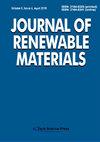Life Cycle Assessment Introduced by Using Nanorefrigerant of Organic Rankine Cycle System for Waste Heat Recovery
4区 材料科学
Q2 Environmental Science
引用次数: 3
Abstract
The use of nanorefrigerants in Organic Rankine Cycle (ORC) units is believed to affect the cycle environment performance, but backed with very few relevant studies. For this purpose, a life cycle assessment (LCA) has been performed for the ORC system using nanorefrigerant, the material and energy input, characteristic indicators and comprehensive index of environmental impact, total energy consumption and energy payback time (BPBT) of the whole life cycle of ORC system using Al2O3/R141b nanorefrigerant were calculated. Total environmental comprehensive indexes reveal that ECER-135 index decrease by 1.5% after adding 0.2% Al2O3 nanoparticles to R141b. Based on the contribution analysis and sensitivity analysis, it can be found out ORC system manufacturing is of the most critical stage, where, the ECER-135 index of ORC component production is the greatest, followed by the preparation process of R141b, transportation phase, and that of Al2O3 nanoparticles preparation is small. The retirement phase which has good environmental benefits affects the result significantly by recycling important materials. Meanwhile, the main cause and relevant suggestion for improvement were traced respectively. Finally, the environmental impacts of various power generations were compared, and results show that the power route is of obvious advantage. Among the renewable energy, ORC system using Al2O3/R141b nanorefrigerant with minimal environmental impact is only 0.67% of coal-fired power generation. The environmental impact of current work is about 14.34% of other nations’ PV results.利用纳米制冷剂进行有机朗肯循环系统余热回收的生命周期评价
在有机朗肯循环(ORC)装置中使用纳米制冷剂被认为会影响循环环境性能,但相关研究很少。为此,对使用纳米制冷剂的ORC系统进行了生命周期评价(LCA),计算了使用Al2O3/R141b纳米制冷剂的ORC系统全生命周期的材料和能量投入、环境影响特征指标和综合指标、总能耗和能源回收期(BPBT)。总环境综合指数显示,在R141b中加入0.2% Al2O3纳米粒子后,ECER-135指数降低1.5%。通过贡献分析和灵敏度分析可知,ORC体系制造处于最关键阶段,其中ORC组分生产的ECER-135指数最大,其次是R141b的制备过程,输运阶段,Al2O3纳米颗粒制备的ECER-135指数较小。在具有良好环境效益的回收阶段,重要材料的回收对结果影响较大。同时,对其产生的主要原因进行了分析,并提出了相应的改进建议。最后,对不同发电方式对环境的影响进行了比较,结果表明该供电方式具有明显的优势。在可再生能源中,使用对环境影响最小的Al2O3/R141b纳米制冷剂的ORC系统仅为燃煤发电的0.67%。目前的工作对环境的影响约为其他国家光伏结果的14.34%。
本文章由计算机程序翻译,如有差异,请以英文原文为准。
求助全文
约1分钟内获得全文
求助全文
来源期刊

Journal of Renewable Materials
Materials Science, Composites; Polymer Science; Green & Sustainable Science & Technology-
CiteScore
4.10
自引率
0.00%
发文量
125
期刊介绍:
This journal publishes high quality peer reviewed original research and review articles on macromolecules and additives obtained from renewable/biobased resources. Utilizing a multidisciplinary approach, JRM introduces cutting-edge research on biobased monomers, polymers, additives (both organic and inorganic), their blends and composites. JRM showcases both fundamental aspects and applications of renewable materials. The fundamental topics include the synthesis and polymerization of biobased monomers and macromonomers, the chemical modification of natural polymers, as well as the characterization, structure-property relationships, processing, recycling, bio and environmental degradation and life cycle analysis of the ensuing materials, in view of their potential applications. Within this sustainability approach, green chemistry processes and studies falling within biorefinery contexts are strongly favored.
 求助内容:
求助内容: 应助结果提醒方式:
应助结果提醒方式:


